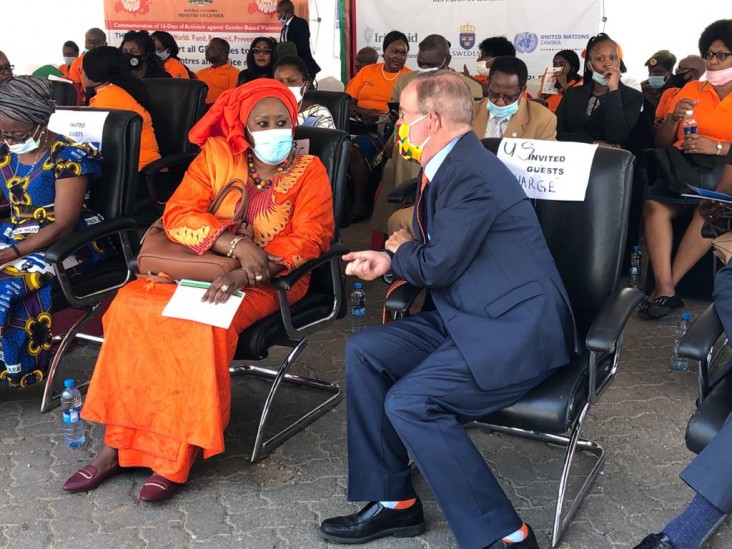Speeches Shim

His Excellency President of the Republic of Zambia, Dr. Edgar Chagwa Lungu
Honorable Elizabeth Phiri, Minister of Gender
Ms. Coumba Mar Gardio, UN Resident Coordinator
Ladies and gentlemen
All other protocols observed.
Good morning. On behalf of the U.S. government, I am honored to join you to commemorate the International Day for the Elimination of Violence Against Women and to help launch the annual 16 Days of Activism Against Gender-Based Violence (GBV).
Violence against girls and women continues to be one of the most widespread, persistent human rights violations in our world today. Whether it is intimate partner violence, sexual violence, harassment, trafficking, or child marriage, gender-based violence impacts the affected individual’s life in a myriad of ways and can limit them from reaching their full potential. Studies have shown that the current COVID-19 pandemic has led to increased violence against women in many countries around world, including countries in our region.
This year, the United Nations is urging countries around the world to Unite for Action by accelerating concrete policy responses to GBV and promoting zero tolerance across all spheres of society. To reach this important goal, Zambia’s Ministry of Gender has outlined four key priorities. They include advocating for funds to expand and strengthen GBV prevention and response, encouraging stakeholders to recommit to national zero tolerance of GBV, improving the quality of and access to GBV response services, and establishing more robust data collection.
I am proud to say that the U.S. government’s support for GBV in Zambia is fully in line with these four priorities. We are deeply committed to keeping girls and women safe from all forms of violence. Since 2005, the U.S. Agency for International Development and the President’s Emergency Plan for AIDS Relief, commonly known as PEPFAR, have partnered with Zambia to increase support for gender equality, strengthen GBV-response services, and support the laws and policies that ensure protection for survivors and justice for perpetrators.
These services support young women like Brenda (not her real name) from Chipata. Two men attacked Brenda the day before the start of a USAID-supported outreach program in her community. After learning about services offered through GBV One-Stop Centers, Brenda approached the outreach team for support. She received counseling and health services, including HIV post-exposure prophylaxis. Brenda’s report also triggered an investigation by the Zambia Police’s Victim Support Unit to hold accountable the men behind her attack and prevent them from harming other girls in the community.
In the coming year, the United States will intensify efforts to help our partners in the government and civil society protect young women like Brenda and prevent and respond to GBV throughout the country. Through PEPFAR’s support of DREAMS and Faith and Communities Initiatives, and under our new Empowered Youth program, we will expand the implementation of evidence-based programming to prevent sexual violence against children. Programs will include “Coaching Boys into Men,” which trains athletic coaches to teach young male athletes about healthy relationships, and IMPower, which teaches girls the verbal, and physical skills to prevent sexual assault. Additional interventions will work with parents and community members to create an environment that keeps children safe.
As we work together to end violence against girls and women, we urge the Ministry of Community Development and Social Services to establish a special fund for survivors of GBV. Currently, one of the largest barriers preventing women from seeking post-GBV care, and pursuing criminal justice, is loss of financial support—including food and shelter. Often, survivors know their perpetrators and may depend on these individuals for their livelihoods. The availability of funds to meet basic needs allows the survivor to seek and receive care.
Additionally, we advocate for better response coordination to cases of GBV at provincial, district, and sub district level. This includes close collaboration between GBV One-Stop-Centers, clinical care providers, and law enforcement and legal services. Sharing critical information and tracking each GBV case will increase the likelihood that perpetrators will be held accountable and that survivors will receive justice.
Today, as we launch the 16 Days of Activism Against Gender-Based Violence, I think about women like Brenda—women who now have hope that their situations can change because of the GBV services. I want to thank you, once more, for the opportunity to speak at this important event. It is our honor to join you in the fight to end gender-based violence in Zambia

Comment
Make a general inquiry or suggest an improvement.